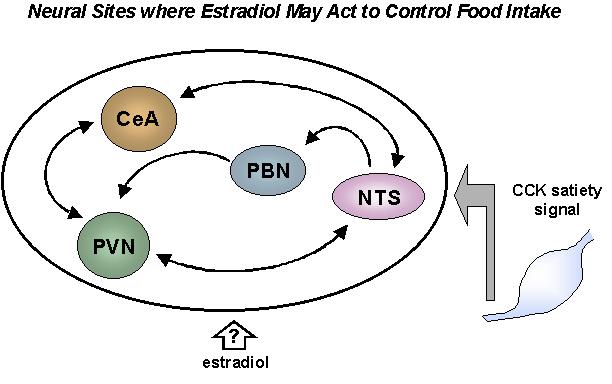|
Estradiol and the Control of Food Intake |
|
Estradiol Decreases Food
Intake The steroid hormone estradiol is involved in the
physiological control of food intake. In rats, increased estradiol secretion
reduces food intake during the estrous phase of the ovarian reproductive
cycle and surgical removal of the ovaries (ovariectomy) increases food intake
and alters feeding patterns. How Does Estradiol Decrease Food Intake? Increasing evidence suggests that estradiol
decreases food intake, at least in part, by increasing the satiating potency
of cholecystokinin (CCK), a peptide that is secreted from the small intestine
during a meal. CCK functions to reduce food intake by generating a
negative-feedback signal that is relayed to the brain via the vagus nerve.
This signal is part of the mechanism that terminates a meal. One of the
projects in our lab investigates how estradiol interacts with CCK to control
food intake in female rats. Recently, we have discovered that estradiol
increases neuronal activity induced by the consumption of a meal and by
peripheral injection of CCK. These findings suggest that estradiol may
control feeding by modulating the activity of neurons implicated in the
central processing of satiety signals. The following diagram illustrates some
of the brain regions where we see this effect. Abbreviations: CeA; central
nucleus of the amygdala, PVN; paraventricular nucleus of the hypothalamus,
PBN; parabrachial nucleus, NTS; nucleus of the solitary tract. |
